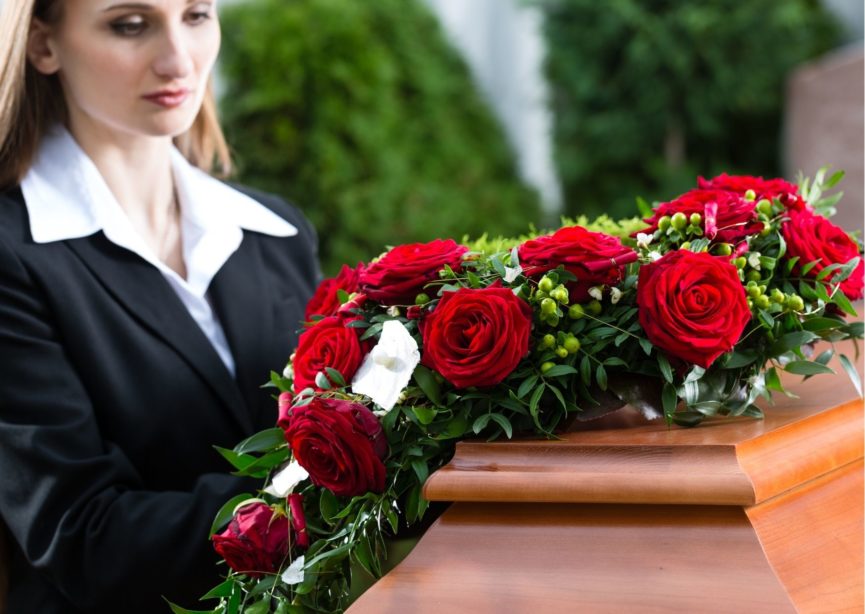What’s it like to be a funeral director? When I tell people that I work for a funeral director, I’m always fascinated by the different responses I get. Your job is something that comes up in conversation frequently and so I have had a lot of time to ponder how people react and why. Recently I went to a new hairdresser. She asked me, “So, what do you do for a living?”. Me: “I work for a funeral director.” Her: “Oh…” There is no one typical response when you tell someone you work in the funeral business. Some people, like my new hairdresser, fall into an awkward silence before trying desperately to change the subject. Others crack jokes, some of which are actually pretty funny, and some I have heard a million times before (like working in the ‘dead centre’ of town). Other people are genuinely interested about what I do and why, while others ask questions about death and the supernatural, or what my beliefs are about what happens when we die (I try to navigate around the latter question as tactfully as possible). On the whole, people are fascinated, even if it makes them feel a bit awkward. A lot of people think that making a living out of death is a bit morbid, but honestly, most people I talk to have an immense curiosity about what it is like to be a funeral director, too. The thing is, death is a part of life. We all die. Now, I’m not a funeral director. Yes, I work for a funeral business, but I’m the marketing manager! That’s not to say that I don’t deal with the death side of the business – I do. I occasionally attend funerals, speak with grieving families, hand over the ashes of lost loved ones who have been cremated, and being involved in funeral arrangements is not out of the question if needed. Of course, I could just tell people that I work in marketing, but I find the different responses I get fascinating, and it often leads to me wondering why people are so uncomfortable with the idea of an individual or company that makes a living out of death when so many of them are curious about what it is we do. A question that we get asked a lot is how do we cope with death all day, every day? It goes without saying that working as a funeral director can be emotionally challenging, and serving small, regional communities undoubtedly plays a role in this. Everyone knows everyone else in small towns, so it’s inevitable that sometimes we will have personal relationships in some form or another with the deceased people that come into our care. There are times where we are forced to confront our own mortality, too, particularly when we are caring for someone who has died in very tragic circumstances and their loved ones. There is a flipside, though. As funeral directors, our whole team feels deeply … Read More
How to talk to children about death
Most people find death something that is uncomfortable to talk about, but knowing how to talk to children about death can be particularly difficult. If not done right, it can be a traumatic experience for both the adult and the child taking part in the conversation. You might not have considered the need to discuss death with your child, but unfortunately it is something that they will definitely have to deal with during their life. Whether your child’s first experience with death is that of a much loved pet, a grandparent sibling, parent or friend, you will still need to be prepared for the big conversation. It may be that your child hasn’t experienced the death of someone or something they love before, but they are worried about death in some way. You will still find this article useful if that’s the case for you. It can often be helpful to initiate conversation around death with your child before they experience the death of a loved one. We know it’s not easy, so before you jump in, grab a cuppa then have a read of this blog post to arm yourself with what you need to know about talking to your child about death. Before you start The first thing to remember is that death is a part of life. All living things die eventually. Plants, animals, humans… we all die. We suggest you are as honest as possible while still remaining age appropriate for the child you are speaking with. If you have the opportunity, it’s best to think about what you are going to say and how you are going to say it before the conversation takes place. Consider some of the questions your child might ask you about death and dying (we have listed some examples of questions children ask about death later in this article) and have an answer ready. How you answer may depend on your own religious beliefs if you have any. If you don’t know something, it’s okay to admit that, but above all else be sensitive to your child’s emotions during this conversation. Find a comfortable place to have this important chat with your child – somewhere that is not only physically comfortable, but also somewhere they feel safe and loved. If you have the conversation about death sprung on you, do your best to remain as relaxed as possible. While showing some emotion is fine, it isn’t the time for big displays of emotion. Take your time. Part of the reason such conversations can be so difficult is because we often avoid talking about things we find upsetting. Indeed, death is frequently a taboo subject, so if you feel like you will struggle with this conversation, practice with another adult first. Use the word ‘death’ This might sound harsh to some, but by using the word death we help to avoid confusion. Think of the different words and phrases we use to say someone has died – passed, passed away, passed … Read More
Pre-planning your own funeral
This week on our blog, we’re talking about pre-planning your own funeral. Pre-arranged funerals have increased in popularity over recent years. In this article we will explore the benefits of pre-planning your own funeral, how we can help and some of the things you will need to consider before getting started. Why should you plan your own funeral? Planning your own funeral has plenty of advantages. Perhaps the most obvious advantage of pre planning your own funeral is that doing so means you can rest assured that your life will be celebrated in the way you wish. When you pre-plan your funeral, the choices are yours – you get to choose whether you are cremated or buried, the type of ceremony or service you are remembered with, you can choose your own coffin and even the songs and dress code for your final farewell. By preplanning your funeral, you get to be remembered the way you wish to be. Another reason that pre-paid and pre-arranged funerals are worthy of consideration is that doing so spares those you love of the angst and stress of trying to plan a funeral at what is likely to be one of the worst times of their lives. You are also sparing them of the financial burden that inevitably comes with arranging a funeral. Because of this, pre-arranging your funeral is a loving and thoughtful gift you can leave for your family when you pass away. Having a pre-arranged funeral also means that you have the opportunity to change your mind. Perhaps in 10 years time you decide you want everyone to wear bright colours to your final farewell and that donations should be made to a specific charity in lieu of flowers – all you need to do is get in touch and let us know that you would like some changes made. We are happy to help! Is it weird to plan your own funeral? Of course not! There is nothing weird about easing the burden of planning your funeral on the people you love most. Planning your own funeral helps to ease possible arguments over money and funeral arrangements, and as we have said, it means your life is celebrated your way. How do you pre plan your own funeral? There is a lot to think about when it comes to planning your own funeral, and the first vital step in the process is deciding what your end of life wishes are. We have already discussed this on our blog, so if you haven’t already, head on over to last week’s blog post and have a read. You will also find handy free downloads including our new My Final Wishes planner, a different planner from the Australian Funeral Directors Association, and another lovely print out to record your life story. Once you have established what your end of life wishes are, the next step is to get in touch with us. Burnett Regional Funeral Services offers pre-arranged pre-paid funerals in conjunction with … Read More
Talking about your final wishes
Whether we like it or not, one of the few certainties of life is death. Discussions around death can be uncomfortable, and talking to your friends and family about your final wishes can be a difficult and emotional conversation for all involved It doesn’t matter whether you’re healthy or suffering from a terminal illness – none of us know when our time is up. For that reason, it is important to prioritise discussing your final wishes with your family. In fact, documenting your final wishes and ensuring your loved ones are aware of those wishes is a loving gift you can leave behind when you pass away. Decide what your final wishes are You need to have a clear idea of what your final wishes are before you open the conversation with friends and family. There are many factors to take into consideration. Would you like a religious funeral in a church, or a more casual memorial? Would you like to be buried or cremated? There are many questions to take into consideration, and our free printable final wishes template can help you to map out your wishes in an easy to complete and read format. Use the completed worksheets during your discussion with your family and ensure your next of kin and at least one other person has a copy and knows where the original of both your planner and your final will and testament is stored. Taking that first step and initiating any conversation around death is difficult, but don’t worry, we’re here to help. Starting the conversation around final wishes and death One of the most important parts of discussing your final wishes with your family is how you open the conversation. We would suggest making your intentions of opening the door to this discussion clear to your friends and family – it’s best not to blindside them. Decide who you would like to be involved in the conversation, and set a time and place for this to take place. Where would those involved in the discussion feel most at ease? For some, this might mean arranging for your discussion to take place on neutral ground. For others, a meeting around the kitchen table might be the most comfortable. Ensuring everyone feels as comfortable as possible – including yourself – is important. Express to those you wish to include how important it is to you to have this conversation, as this makes it more likely for them to willingly participate. At first, you may find it easier to limit the number of people involved in the conversation and then include others later. It is important that everyone who will be involved in making arrangements after you pass away is included in the conversation at some point, as this can help to avoid conflict when the time comes. You might even like to practice the conversation around your final wishes with a friend before discussing it with your family. Remember, you don’t have to discuss everything in one … Read More




